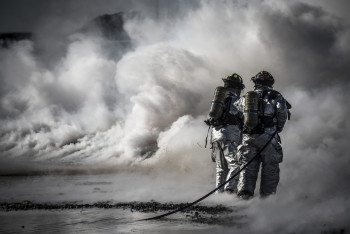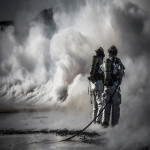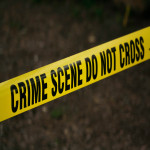When it comes to home safety, there are a variety of factors that need to be considered in order to keep your home and the people who live in it safe. This time of year brings with it numerous fire prevention and protection efforts, whether it is at the school, work or home. After all, it is safer to light a candle than curse the darkness.
This time of year also brings with it an increased risk of wildfires and other natural disasters. As such, there are several steps you can take to protect your home from not only fire but also against other potential dangers during this time of year and throughout the rest of the year as well.
Whether you’re looking for tips on how to protect your home from fire or ways to prevent one from happening in the first place, here are some great things you can do today to help ensure your home remains safe for everyone who lives in it this fall season and all year round.
1. Install Working Smoke Detectors
Smoke detectors are an important part of any home safety plan. They are relatively inexpensive and can be easily installed. Smoke detectors can alert you to a fire in your home, giving you and your family time to escape. According to the National Fire Protection Association, three out of five home fire deaths occur in homes without working smoke alarms. Smoke alarms should be installed in every bedroom, outside each sleeping area, and on every level of the home, including the basement. Test your smoke alarms monthly to make sure they are working properly. Replace the batteries at least once a year. If your smoke alarm is more than 10 years old, it should be replaced. If a fire does occur in your home, get out immediately and call 9-1-1 from a safe location. Do not try to fight the fire.
2. Check Your Home’s Exits and Have an Evacuation Plan
Every home should have at least two exits in case of an emergency. The best way to ensure your family can safely evacuate your home is to have a plan and practice it regularly. Your home’s exits may include windows and doors. Make sure all windows and doors can be opened easily and that there are no obstacles blocking them. Keep a flashlight and a pair of shoes near each exit in case you need to evacuate at night or in the dark. Your evacuation plan should be specific to your home and your family’s needs. It should include a designated meeting place outside of your home where everyone will meet after evacuating. Practice your evacuation plan regularly so everyone knows what to do and where to go in case of an emergency.In the event of a fire, remember to stay low to the ground where the air is cooler and less smoky. If you must evacuate through smoke, cover your nose and mouth with a wet cloth. If you can’t get to an exit, go to a room with an outside window and wave a brightly colored piece of cloth to signal for help. If there is a severe weather emergency, such as a tornado, hurricane, or severe flooding, follow the instructions of local officials.
emergency situations. An evacuation plan is a procedure for exiting a building or area in the event of a disaster or emergency. The plan should be designed to safely get occupants out of the building as quickly and efficiently as possible. The importance of having an evacuation plan cannot be overstated. In an emergency situation, every second counts. Having a plan in place beforehand can mean the difference between life and death. An evacuation plan should be specific to the building or area it is for. It should take into account all possible exits and escape routes. It should be reviewed and updated regularly to ensure that it is up-to-date and relevant. Everyone in the building or area should be familiar with the evacuation plan. Regular drills should be conducted so that everyone knows what to do and where to go in the event of an emergency. In the event of an emergency, the first priority should be to get everyone to safety. Once everyone is out of the building or area, then authorities can be contacted and the necessary steps can be taken to deal with the emergency. An evacuation plan is a vital tool in keeping people safe in an emergency situation. It is important to have a plan in place and to regularly review and update it. Everyone
3. Check for Bad Electric connection
Bad electric connections are one of the leading causes of fire in the home. They can be caused by a number of factors, including faulty wiring, overloaded circuits, and improper grounding. Even something as simple as a loose outlet can cause a fire if it’s not repaired. Most homes have some type of electrical fire every year, and the consequences can be devastating. In addition to the damage caused by the fire itself, electrical fires also release harmful toxins into the air that can cause respiratory problems. There are a few things you can do to prevent electrical fires in your home. First, make sure all your wiring is up to code and in good condition. Second, don’t overload circuits by plugging in too many devices. And third, always use proper grounding techniques when working with electricity. If you do have an electrical fire, it’s important to act quickly. Turn off the power at the breaker if you can safely do so, and then call 103. Don’t try to put the fire out yourself, as you could be electrocuted.
Electrical fires are preventable, but they do happen. By taking some simple precautions, you can keep your family safe from this potentially deadly hazard
4. Secure the kitchen from fire.
A kitchen is the heart of the home and where we cook, eat and socialize. But, it’s also one of the most common places for house fires to start. In fact, according to the National Fire Protection Association, cooking equipment is the leading cause of home structure fires and home fire injuries. Here are some tips to help you keep your kitchen safe from fire:•Keep things that can catch fire — like oven mitts, wooden utensils, food packaging, towels and curtains — away from your stovetop.•Don’t leave cooking food unattended. If you have to leave the kitchen for even a short period of time, turn off the stove.•Be extra careful when cooking with oil — it can easily catch fire. If a fire does start, cover the pan with a lid to smother it.•Keep a fire extinguisher in your kitchen and know how to use it.•If a fire does start and you can’t put it out, get out of the house and call 103.
5. Install Fire Extinguishers in Key Areas of your home
When it comes to protecting your home from fire, there are few things more important than having a fire extinguisher in key areas. Fire extinguishers can help put out small fires before they have a chance to spread, and they can also help prevent serious injuries in the event of a fire. There are a few things to keep in mind when choosing fire extinguishers for your home. First, you'll want to choose an extinguisher that is rated for the type of fires that are most likely to occur in your home. For example, if you live in an area with a lot of forest fires, you'll want to choose an extinguisher that is rated for Class A fires. You'll also want to choose an extinguisher that is the right size for the area in which it will be used. If you're placing an extinguisher in a small room, such as a bathroom, you'll want to choose a small extinguisher. On the other hand, if you're placing an extinguisher in a large area, such as a garage, you'll want to choose a larger extinguisher. Once you've chosen the right fire extinguisher for your home, you'll need to install it in a location where it can be easily accessed in the
There are a few things you can do to help keep your family safe from fire in your home. First, make sure to have working smoke detectors on every level of your home and in every bedroom. Test them monthly and replace the batteries at least once a year. Second, create and practice a home fire escape plan with your family so everyone knows what to do in case of a fire. And finally, keep flammable items like matches and lighters out of reach of children. By following these simple steps, you can help keep your home and your family safe from fire.
Thanks for reading! We hope you found our tips helpful. Remember, fire safety is everyone's responsibility. Take the time to educate yourself and your family on the best ways to prevent and protect against fires.




